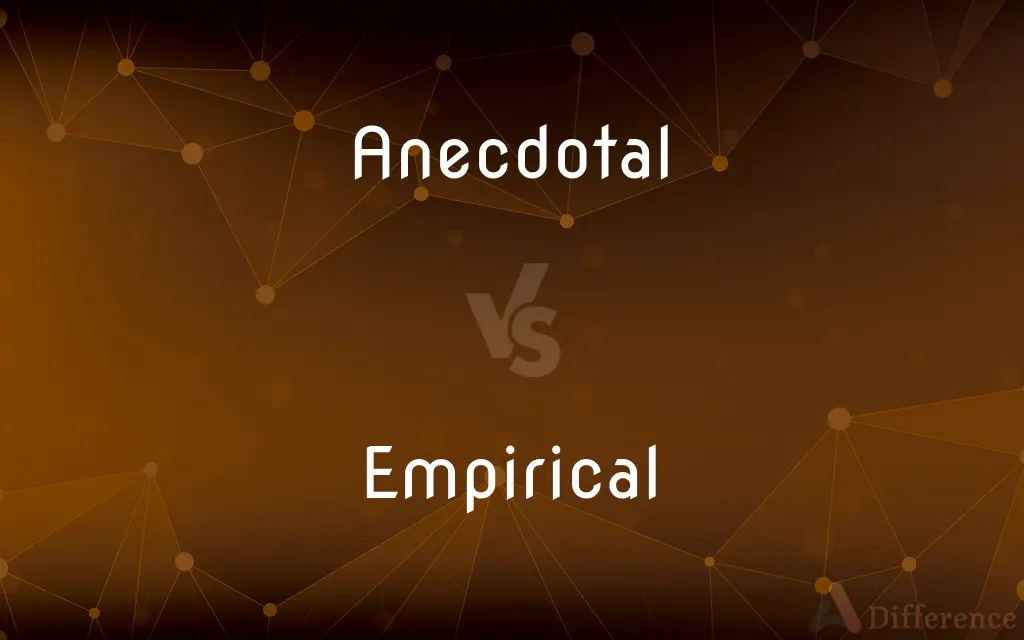Anecdotal vs. Empirical — What's the Difference?
By Maham Liaqat & Urooj Arif — Updated on April 3, 2024
Anecdotal evidence is based on personal stories and experiences, while empirical evidence relies on observation and experimentation.

Difference Between Anecdotal and Empirical
Table of Contents
ADVERTISEMENT
Key Differences
Anecdotal evidence consists of personal stories, observations, or specific instances that people share to support a claim or argument. These accounts are subjective and often lack rigorous testing or widespread verification. In contrast, empirical evidence is derived from systematic observation, experimentation, or any method of research that can be verified or tested by others. This approach emphasizes objectivity and the reproducibility of findings, highlighting the fundamental differences in reliability and validation between the two types of evidence.
While anecdotal evidence can be compelling and provide initial insights or hypotheses, it is prone to biases such as selective memory and personal interpretation. Empirical evidence, on the other hand, seeks to minimize these biases through controlled experiments and statistical analysis, ensuring that conclusions are based on broader, more objective observations rather than individual experiences. This contrast underlines the importance of empirical evidence in establishing scientific and factual accuracy.
Anecdotal evidence is often more accessible and easier to understand for the general public, making it influential in shaping opinions and beliefs. Empirical evidence, while more reliable, can be complex and require specialized knowledge to interpret correctly. This distinction highlights the different roles these types of evidence play in communication and decision-making, with anecdotal evidence often serving to engage interest and empirical evidence providing the basis for informed conclusions.
In certain contexts, such as preliminary research or case studies, anecdotal evidence can be valuable for identifying areas that warrant further empirical investigation. However, empirical evidence is necessary for establishing causal relationships and generalizable truths, underscoring the complementary yet distinct roles of anecdotal and empirical evidence in the spectrum of knowledge gathering and validation.
Despite the differences, both anecdotal and empirical evidence have their places in discourse and research. Anecdotal evidence can spark curiosity and lead to the formulation of hypotheses, while empirical evidence is crucial for testing these hypotheses and contributing to the body of scientific knowledge. The key is to recognize the limitations and appropriate applications of each to draw accurate and meaningful conclusions.
ADVERTISEMENT
Comparison Chart
Basis
Personal stories and experiences
Observation and experimentation
Objectivity
Subjective and prone to bias
Objective and seeks to minimize bias
Verification
Difficult to verify broadly
Can be systematically verified or tested
Role in Research
Can generate hypotheses
Used to test hypotheses and establish facts
Strengths
Accessible, engaging
Reliable, generalizable
Compare with Definitions
Anecdotal
Subject to individual biases and interpretation.
Memories of weather patterns from childhood.
Empirical
Aims to be objective and reproducible.
A study's results are confirmed through replication.
Anecdotal
Often used in informal argument or storytelling.
Testimonials in product advertising.
Empirical
Necessary for establishing factual truths.
Proving a new theory through experiments.
Anecdotal
Difficult to generalize from.
An unusual medical recovery may not apply widely.
Empirical
Forms the basis of scientific consensus.
The link between smoking and lung cancer.
Anecdotal
Based on personal or isolated experiences.
A friend's recovery from illness after using a certain treatment.
Empirical
Based on systematic research and evidence.
A clinical trial testing a new drug's effectiveness.
Anecdotal
Can inspire further scientific research.
A doctor investigates a cure based on patient stories.
Empirical
Provides generalizable findings.
Statistical analysis of climate change data.
Anecdotal
Also an·ec·dot·ic (-dŏtĭk) or an·ec·dot·i·cal (-ĭ-kəl) Of, characterized by, or full of anecdotes.
Empirical
Relying on or derived from observation or experiment
Empirical results that supported the hypothesis.
Anecdotal
Based on casual observations or indications rather than rigorous or scientific analysis
"There are anecdotal reports of children poisoned by hot dogs roasted over a fire of the [oleander] stems" (C. Claiborne Ray).
Empirical
Verifiable or provable by means of observation or experiment
Empirical laws.
Anecdotal
Of the nature of or relating to an anecdote.
Empirical
Guided by practical experience and not theory, especially in medicine.
Anecdotal
Containing or abounding in anecdotes.
Empirical
Pertaining to or based on experience .
The lengths were calculated according to the empirical rules of the trade.
For some presumptive diagnoses, empirical antibiotic therapy begins immediately, whereas specific antibiotic therapy must await the results of the culture and sensitivity test.
Anecdotal
Pertaining to, or abounding with, anecdotes; as, anecdotal conversation.
Empirical
Pertaining to, derived from, or testable by observations made using the physical senses or using instruments which extend the senses.
Anecdotal
Having the character of an anecdote;
Anecdotal evidence
Empirical
(philosophy of science) Verifiable by means of scientific experimentation.
Demonstrable with empirical evidence
Anecdotal
Characterized by or given to telling anecdotes;
Anecdotal conversation
An anectodal history of jazz
He was at his anecdotic best
Empirical
Derived from experiment and observation rather than theory;
An empirical basis for an ethical theory
Empirical laws
Empirical data
An empirical treatment of a disease about which little is known
Empirical
Relying on medical quackery;
Empiric treatment
Common Curiosities
Can anecdotal evidence ever be useful in scientific research?
Yes, it can generate hypotheses or offer insights for further empirical investigation but is not sufficient to establish causal relationships.
How does one convert anecdotal evidence into empirical evidence?
By systematically investigating the claims made in anecdotal evidence through controlled experiments and observation.
What role does empirical evidence play in policymaking?
It provides a factual basis for decisions, helping to ensure policies are effective and based on proven outcomes.
Why might empirical evidence be challenging to interpret for the layperson?
It often involves complex statistical analysis and understanding of research methodologies that require specialized knowledge.
Can anecdotal evidence be considered a form of data?
While it can provide initial insights, it lacks the rigor and objectivity to be considered reliable data in scientific terms.
How can anecdotal evidence mislead?
It can overemphasize unusual cases, ignore broader trends, and reflect selective or distorted memories.
Is all empirical evidence equally reliable?
The reliability can vary based on the study's design, sample size, methodology, and the rigor of the peer review process.
Why is empirical evidence considered more reliable than anecdotal evidence?
Empirical evidence is based on systematic observation and experimentation, making it more objective and less prone to individual biases.
Why do people often find anecdotal evidence compelling?
Because it is relatable and easy to understand, and personal stories can be more emotionally engaging than statistical data.
How is empirical evidence gathered?
Through methods like experiments, observations, and surveys that can be independently verified or replicated.
How do scientists confirm the reliability of empirical evidence?
Through replication of studies, peer review, and consensus within the scientific community.
What is the danger of relying solely on anecdotal evidence?
It may lead to incorrect conclusions due to biases, lack of representativeness, and failure to account for other variables.
What is the role of anecdotal evidence in consumer decision-making?
It often influences purchases through reviews and testimonials, despite its subjective nature.
Can a single piece of empirical evidence prove a theory?
Generally, multiple pieces of evidence and consistent findings across different studies are required to establish a theory.
How do empirical and anecdotal evidence differ in legal contexts?
Empirical evidence is preferred for its objectivity, but anecdotal evidence can sometimes play a role in understanding the context or motivations.
Share Your Discovery

Previous Comparison
Irrational vs. Paranoia
Next Comparison
Cosseter vs. OsseterAuthor Spotlight
Written by
Maham LiaqatCo-written by
Urooj ArifUrooj is a skilled content writer at Ask Difference, known for her exceptional ability to simplify complex topics into engaging and informative content. With a passion for research and a flair for clear, concise writing, she consistently delivers articles that resonate with our diverse audience.















































